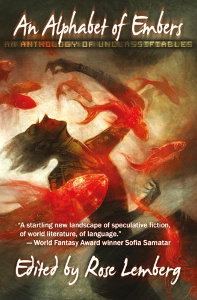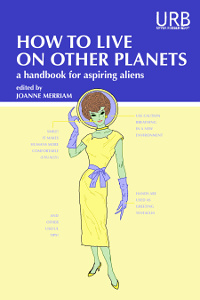 First Published: 24th August, 2016
First Published: 24th August, 2016
Genre: Speculative Fiction / Short Story Anthology
Authors: Grace L. Dillon; Niigaanwewidam James Sinclair; Richard Van Camp; Cherie Dimaline; David A. Robertson; Daniel Heath Justice; Darcie Little Badger; Gwen Benaway; Mari Kurisato; Nathan Adler; Cleo Keahna
Available: Amazon.com | Amazon UK
This anthology focuses on Native American two-spirit and QUILTBAG stories. All authors are Native, but not all of them are QUILTBAG. It opens with an introduction from the editor, followed by two pieces that introduce the theme and a little bit about the history of two-spirit people. There are eight stories and one poem, so it’s a relatively short anthology.
There are a number of reoccurring themes. Nations sending out colonists into space is one, and is handled differently in each story that raises it. Another is what makes someone a member of a tribe. “Valediction at the Star View Motel ” (Nathan Adler) has a white girl who was adopted as a child, and “Imposter Syndrome” (Mari Kurisato) is about a non-human trying to get on a colony ship. Both stories share a similar theme, of the tribe viewing a person as a member for being part of the community, and the outside not wanting to acknowledge that. I also liked that “Imposter Syndrome” has an asexual aromantic character. It’s clear this is not because she’s non-human, as another non-human wants a relationship.
A number of the stories are romances. “Né łe!” (Darcie Little Badger) was my favourite of these, as it was about slowly getting to know someone, rather than love at first sight. The concept of transporting pet dogs for wealthy colonists was also fun. A more serious note to the story is about sovereignty, and the contrast between tribes when it comes to being able to maintain it. The Navajo Nation has its own space colony. Whereas the protagonist is Lipan Apache, and her family is forced to leave their farm, with no new home in the stars.
I liked the focus on a parent and child relationship in “Legends Are Made, Not Born” (Cherie Dimaline). Auntie Dave is raising the protagonist, which includes training in two-spirit community responsibilities. It shows ties between two-spirit people outside of sexual relationships, which really shouldn’t be as rare as it is in stories.
Though there are a lot of positive things, I didn’t like “Aliens” (Richard Van Camp). Unfortunately, this was the first story, so wasn’t a good start to the anthology for me. I did like how it was told as people verbally tell stories, but I had some concerns when it was suggested that Jimmy being a gentle person who wasn’t having relationships would mean his life was forgettable. As though it’s not a proper life without sexual relationships. And then once he does have a relationship, the shift is to making fun of his genitals. It’s implied he’s intersex, though even if that wasn’t the specific identity intended, he’s still going to be in one of the groups that frequently gets reduced to being a set of genitals. Those jokes do not feel like jokes to the person constantly on the receiving end of them. Had the story been told from Jimmy’s perspective, and not treated like it was funny, I might have reacted differently. But it was from the perspective of the people doing the laughing. It was presented as a warm and positive thing. Fortunately, it’s the only story in the anthology that isn’t from the perspective of a two-spirit person.
There is some representation across the QUILTBAG, though it’s stronger on LGT than the rest. Lesbians are particularly well represented. Others are less so. I do wish the one possible intersex character had not been handled that way. The binary-gendered language of some of the stories also stood out. This is talking about both genders, rather than all genders. It’s having male roles and female roles, but no room for other roles. Which is an odd choice when the focus is on two-spirit people.
Note that some stories contain descriptions of rape and assault (particularly “Imposter Syndrome”). The term halfbreed is used in a few stories. It’s in a reclaiming context, rather than being used as an insult, but still something mixed race people might want to know is coming in advance.
It’s generally a strong anthology, with a range of approaches to speculative fiction. There are stories where the speculative elements are very light, space adventures, and fantasy. It has cultural representations that do not fall into stereotypes and othering. The QUILTBAG content was mostly good, but there were areas where it was spotty.
[A copy of this book was received from the publisher for review purposes]
 First Published: 6th July, 2016
First Published: 6th July, 2016 First Published: 8th March, 2016
First Published: 8th March, 2016 First Published: 8th February, 2016
First Published: 8th February, 2016 First Published: 16th February, 2015
First Published: 16th February, 2015